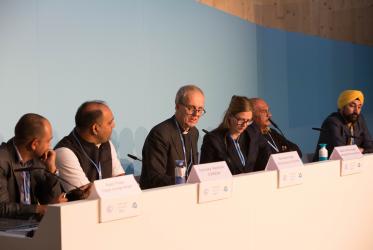Displaying 61 - 80 of 120
10 November 2017
Interfaith statement for COP23 urges change of lifestyles
08 November 2017
A cycling pilgrimage of justice and peace
07 August 2017
G20 summit: call to pray for peace in Hamburg
07 July 2017
Do we need an ecological reformation?
14 June 2017
“Overcoming economic injustice” vision of WCC’s Athena Peralta
23 February 2017
During Lent, a “carbon fast” can honour God’s creation
09 February 2017
Plans for 2017 decided by WCC Executive Committee
01 December 2016
WCC Executive Committee issues statement on climate justice
25 November 2016
New videos help congregations hasten HIV response
20 October 2016
GEM school ends with hope for a better tomorrow
08 September 2016
A just financial and economic architecture is possible, students find
08 September 2016












